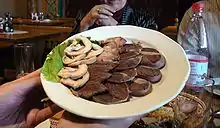Qazı
Qazı is a traditional sausage-like food of Kazakhs, Tatars, Kyrgyz, Uzbeks and other ethnic groups mainly of Central Asia, particularly those of Turkic origin. Kazy is a common element on a dastarkhan, a table set for a festive meal. Qazy is a dish in Kazakh and Kyrgyz cuisines made from sliced horse rib meat in an intestine casing.[1] A reviewer from Vice (magazine) described the dish as smokey and earthy.[1]



Preparation
The horse’s ribs are removed with the meat and hung for 5–7 hours to drain any remaining blood. The intestines are removed and thoroughly washed and then brined for 1–2 hours. The meat from the ribs is salted, seasoned with pepper and garlic and left tied in a cloth for 2–3 hours. Then, the intestines are filled with the meat and the two ends are tied. After this preparation, the kazy can either be smoked at 50–60° for 12–18 hours or dried outdoors for a week in a place exposed to direct sun and wind.
Before serving, the kazy is cooked in boiling water for two hours. The cooked kazy is sliced into 1 cm thick pieces and served with onion and seasonal vegetables.
Serving
Kazi is often eaten cold, sometimes sliced and served as an appetizer. In Uzbekistan it is often served with Pilaf and in Kazakhstan it can be put into Beshbarmak.
In mountainous regions sometimes kazy is made with venison.